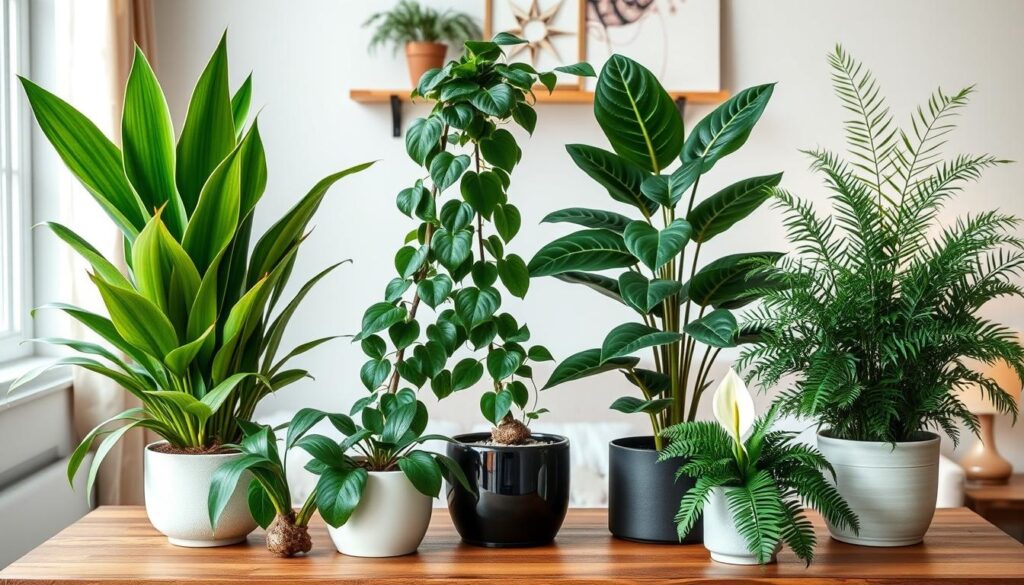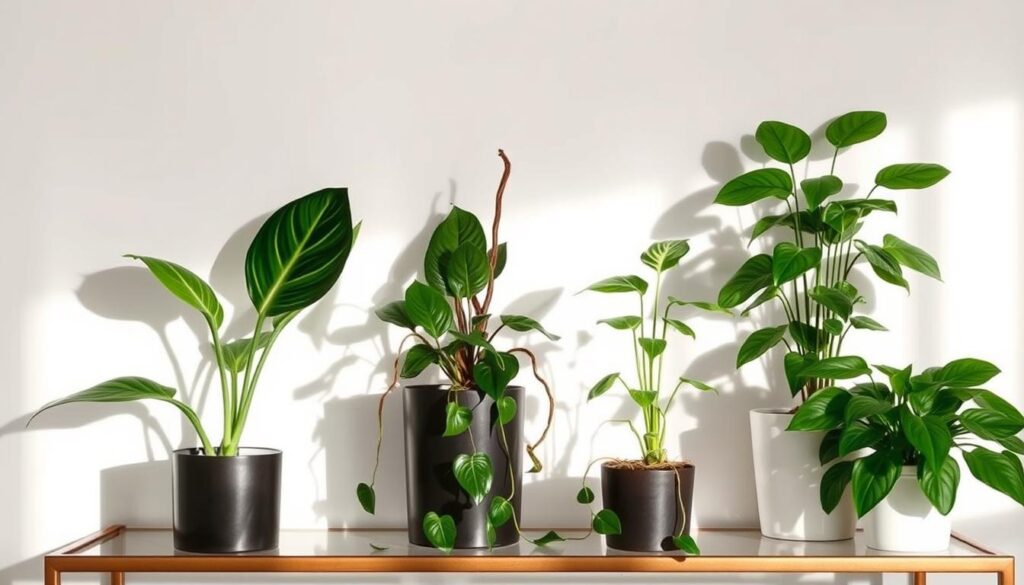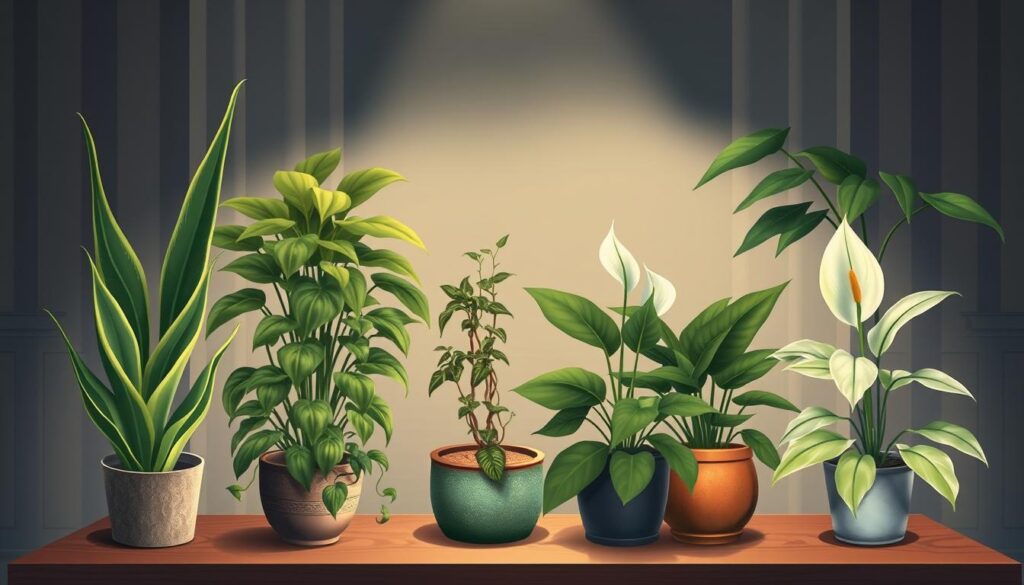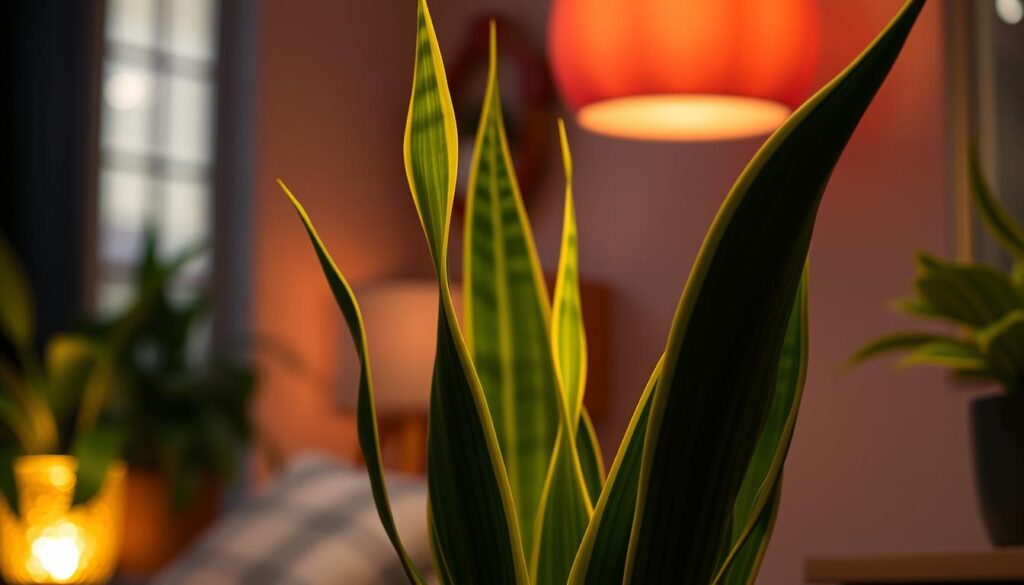Did you know 18% of indoor plants can grow well without direct sunlight? This fact opens up new possibilities for those who love plants but live in low-light places. I’ve found some amazing shade-tolerant plants that can make even the darkest spots in your home or office bright.
I’m thrilled to share my discoveries on the best indoor plants that don’t need much light. These plants are great for anyone who wants to bring nature inside but has limited sunlight. They’re not just tough; many of these plants also clean the air, making your indoor space healthier.
In my search for the perfect indoor plants for low-light spots, I’ve found some incredible species. These plants not only survive but flourish in shaded areas. They’re perfect for places with little sunlight, like apartments, offices, and homes. Plus, many of these plants clean the air, improving your indoor air quality.
Key Takeaways
- 18% of indoor plants can grow without direct sunlight
- Low-maintenance plants are ideal for dimly lit spaces
- Many shade-tolerant plants also purify indoor air
- Some plants can survive weeks without watering
- Proper care techniques help plants thrive in low-light conditions
Introduction to Low-Light Indoor Plants
I love bringing nature indoors, but finding the right plants for darker spaces can be tough. That’s where low-light indoor plants come to the rescue! These easy-care houseplants are perfect for homes and offices with limited natural light.

The challenge of finding plants for dark spaces
Many indoor spaces lack enough sunlight, making it hard to grow traditional plants. But don’t worry! There are plenty of low-maintenance plants that thrive in shade. For example, the ZZ plant can survive without natural sunlight, while the snake plant grows best in partial shade.
Benefits of indoor plants in low-light environments
Adding office plants to dimly lit areas offers many benefits. They purify the air, boost mood, and create a calming atmosphere. Peace lilies, which do well in partial to full shade, are excellent air purifiers. Chinese evergreens bring color to shaded areas and thrive in low-light conditions.
Here’s a quick look at some popular low-light plants and their price ranges:
| Plant | Price Range |
|---|---|
| ZZ Plant | $35.00 – $195.00 |
| Snake Plant | $33.00 – $60.00 |
| Golden Pothos | $18.00 – $68.00 |
| Peace Lily | $72.00 |
With these low-light options, you can transform any dark corner into a lush, green oasis!
Understanding Low-Light Conditions for Plants

Low-light conditions are key in indoor plant care. These areas get less than 4 hours of indirect sunlight each day. Shade-tolerant plants are great for these spaces because they can handle little light.
Knowing about light intensity is crucial for indoor plants. Low-light plants need a photosynthetic photon flux (PPF) of 50-150 umol m-2s-1. This means about 50-250 foot-candles of light. Plants like snake plants, pothos, and ZZ plants do well in these conditions.
No plant can live in complete darkness. Even plants that tolerate shade need some light to make food and grow. A simple test can show how much light your plants get:
- Hold your hand about 12 inches from your plant
- If you see a crisp shadow, it’s bright light
- A fuzzy shadow means medium light
- Barely visible or no shadow means low light
Most tropical plants can’t handle direct sun for more than 3-4 hours. For the best growth, many shade-tolerant plants like bright indirect light. This includes filtered sun, reflected sun, and sky light. Knowing this helps you take better care of your indoor plants.
Best Indoor Plants for Low-Light Environments
Finding the right indoor plants for low sunlight can be hard. I’ve found some low-maintenance plants that do well in dim light. These plants not only survive but can really thrive in low-light spots.
Snake Plant (Sansevieria)
Snake plants are almost impossible to kill. They handle neglect and adjust to different light levels. Their tall, striking leaves add a modern look to any room.
ZZ Plant (Zamioculcas zamiifolia)
ZZ plants are great for those who often forget to water. They have shiny leaves and can live in almost no light. These plants are perfect for offices with fluorescent lights.

Pothos (Epipremnum aureum)
Pothos is a versatile vine that grows well in low light. It’s easy to spread and comes in various leaf patterns. I love how it trails from shelves or hangs in baskets.
Chinese Evergreen (Aglaonema)
Chinese evergreens add color to dark spots. They have different patterns and are great at purifying the air. These plants are perfect for beginners.
Peace Lily (Spathiphyllum)
Peace lilies are beautiful and clean the air. They produce white flowers and do well in low light. These plants are symbols of love and sympathy.
| Plant | Light Needs | Water Frequency | Air Purifying |
|---|---|---|---|
| Snake Plant | Low to Moderate | Every 2-3 weeks | Yes |
| ZZ Plant | Low | Every 2-3 weeks | Yes |
| Pothos | Low to Moderate | Weekly | Yes |
| Chinese Evergreen | Low to Moderate | Every 1-2 weeks | Yes |
| Peace Lily | Low to Moderate | Weekly | Yes |
Snake Plant: The Ultimate Low-Light Survivor
Snake plants are amazing at thriving in low light. They’re great for beginners and those who are always busy. Let’s see why they’re perfect for indoor spaces.
Characteristics and Care Requirements
Snake plants, also known as Sansevieria, have upright leaves with beautiful patterns. They’re very tough and can live in many light conditions, from dim to bright indirect light. Their care is easy:
- Water every 2-6 weeks, letting the soil dry out first
- They can handle neglect, perfect for those who forget to water
- Need well-draining soil to avoid root rot
- Do well in normal room temperatures

Benefits of Snake Plants in Indoor Spaces
Snake plants are not just pretty; they’re also great at cleaning the air. NASA found they remove toxins like formaldehyde and benzene. This makes them a smart choice for healthier homes.
Here’s a look at some other low-light plants:
| Plant | Price | Light Requirement | Watering Frequency |
|---|---|---|---|
| Snake Plant | $14.95 | Low to Bright Indirect | Every 2-6 weeks |
| ZZ Plant | $24.95 | Low to Moderate | Every 2-3 weeks |
| Peace Lily | $19.95 | Low to Moderate | Weekly |
| Pothos | $16.95 | Low to Bright Indirect | Every 1-2 weeks |
With their eye-catching look, easy care, and air-cleaning abilities, snake plants are the best low-light plants for any indoor spot.
ZZ Plant: Thriving in Dark Corners
Looking for a solution for those dark corners in your home or office? The ZZ plant is your go-to. Known as Zamioculcas zamiifolia, it’s a top pick for easy-care houseplants. It can grow up to 3 feet tall, even in low light.
ZZ plants are super forgiving, perfect for those who are busy or tend to forget about their plants. They can go without water for a long time because they’re drought-tolerant. Their shiny, dark green leaves add elegance to any room, making even dark spots look better.
For office plants, ZZ plants are a top choice. They do well under fluorescent lights and can handle neglect during busy weeks. Plus, they help purify the air, making them great for any workspace.
| Plant Name | Maximum Height | Light Requirement | Water Requirement |
|---|---|---|---|
| ZZ Plant | 3 feet | Low to moderate | Low |
| Snake Plant | 3 feet | Low to bright indirect | Low |
| Peace Lily | 3 feet | Low to moderate | Medium |
Want to mix things up? Try pairing your ZZ plant with other low-light plants. Snake plants and peace lilies are great choices, each adding something special to your indoor garden. Even in the darkest spots, these plants can brighten up your space.
Pothos: Versatile and Easy to Grow
Pothos is a top choice for indoor plants because it’s adaptable and easy to care for. It’s perfect for both beginners and experienced plant lovers. This plant comes from the South Pacific and is loved for its heart-shaped leaves and trailing vines.
Different Varieties of Pothos
Pothos has many beautiful types, each with its own look:
- Golden Pothos: Features green leaves with yellow variegation
- Marble Queen: Displays white and green marbled foliage
- Neon Pothos: Boasts bright, lime-green leaves
- Jade Pothos: Showcases solid green leaves
- N’Joy: Exhibits compact growth with white and green leaves
Propagation Techniques for Pothos
It’s easy to grow pothos from cuttings, making it a great indoor plant. Here’s how I do it:
- Cut a 4-6 inch stem below a leaf node
- Remove lower leaves, leaving 2-3 at the top
- Place the cutting in water or moist soil
- Keep in bright, indirect light
- Roots should develop in 1-2 months
Pothos is great as a hanging plant, with vines up to 10 feet long. It can be displayed in many ways, like trailing in baskets or climbing up supports. While it can live in low light, it does best in bright, indirect light. Water when the top inch of soil feels dry, and feed it every 1-3 months during the growing season.
| Care Aspect | Requirement |
|---|---|
| Light | Medium to bright indirect |
| Water | When top 1-2 inches of soil dry |
| Temperature | 65-80°F (18-27°C) |
| Humidity | 40-60% |
| Soil pH | 6.1-6.5 (slightly acidic) |
Chinese Evergreen: Bringing Color to Shaded Areas
I adore Chinese Evergreen plants for their knack of lighting up dark spots. These low-maintenance plants are great for those with little time or new to indoor gardening. Their leaves come in colors like gray, red, cream, and green, adding a splash of color indoors.
Chinese Evergreens grow slowly and can get 1-3 feet tall and wide. They come from Asia and love partial to full shade. This makes them perfect for indoor spots with little sunlight.
These plants are also great at cleaning the air. NASA says they can remove pollutants from indoor air. So, they’re not just pretty; they’re also good for your health.
“Chinese Evergreens are like nature’s air fresheners, quietly cleaning the air while adding a touch of tropical beauty to your home.”
Looking after Chinese Evergreens is easy:
- Water when the top inch of soil feels dry
- Prefer temperatures between 65-80°F
- Thrive in high humidity
- Fertilize twice a year or lightly every month in spring and summer
But, remember, these plants are toxic to pets. So, keep them away from cats and dogs. With the right care, your Chinese Evergreen will brighten and freshen your home for many years.
| Feature | Description |
|---|---|
| Scientific Name | Aglaonema commutatum |
| Mature Size | 1-3 feet tall, 1-3 feet wide |
| Light Preference | Partial to full shade |
| Soil pH | 5.5 – 6.5 (slightly acidic) |
| USDA Hardiness Zones | 10-12 |
Peace Lily: Elegant and Air-Purifying
Peace lilies are beautiful plants that make any room look elegant. They do well in low light, which is great for dark corners of my home.
Caring for peace lilies in low-light conditions
These plants are easy to care for, even in shady spots. I keep mine in indirect light and it’s doing great. They can grow up to 16 inches tall, adding a lush look to my space.
It’s important to keep the soil moist but not too wet to prevent root rot. This way, my peace lily stays healthy.
Air-purifying qualities of peace lilies
Peace lilies are not just pretty; they clean the air too. NASA found they remove harmful chemicals like benzene and formaldehyde. Since I added them, my home’s air quality has gotten better.
With the right care, peace lilies produce beautiful white blooms. These plants are great for anyone wanting cleaner air and a touch of nature indoors.
| Feature | Peace Lily |
|---|---|
| Light Preference | Low to medium light |
| Air Purification | Removes benzene, formaldehyde, trichloroethylene, toluene, xylene |
| Indoor Height | Up to 16 inches |
| Watering Needs | Consistent moisture |
| Flowering | Produces white bracts with sufficient light |
Additional Low-Light Plant Options
If you’re looking for more shade-tolerant plants, I’ve got you covered. These plants are perfect for low-light spots in your home or office. They’re easy to care for and great for beginners.
Cast Iron Plant (Aspidistra elatior)
The Cast Iron Plant is tough and can thrive in many conditions. It grows up to 3 feet tall, making it ideal for larger spaces. Its dark green leaves add elegance to any room.
Dracaena Varieties
Dracaena plants are great air purifiers and come in many types. The Corn Plant can grow up to 6 feet indoors. These plants are perfect for adding height and interest to your space.
Spider Plant (Chlorophytum comosum)
Spider Plants are popular in offices for a reason. They’re easy to care for and grow quickly when trimmed. They prefer bright indirect light but can handle low light. Plus, they produce small plantlets that are fun to propagate.
| Plant | Max Height (Indoor) | Light Preference |
|---|---|---|
| Cast Iron Plant | 3 feet | Low to moderate |
| Dracaena (Corn Plant) | 6 feet | Low to bright indirect |
| Spider Plant | 1-2 feet | Bright indirect to low |
These shade-tolerant plants are perfect for any indoor garden. They’re great for beginners and can grow in various light conditions. They’re versatile choices for your home or office.
Tips for Caring for Low-Light Plants
Caring for low-light plants is special. These plants are resilient but still need care to do well. Here are some key tips for your shade-loving plants.
Start with watering. Low-light plants usually need less water than plants that love the sun. Always check the soil before watering to avoid overwatering, which can cause root rot.
It’s important to keep leaves clean to help them absorb light better. I use a damp cloth to gently wipe the leaves every few weeks. This simple step can greatly improve your plant’s health.
Turning your plants regularly is also crucial for even growth. I turn mine a quarter turn each week to make sure they get light evenly. This stops them from growing lopsided and keeps them looking great.
“Light plays a crucial role in plant growth, with most plants preferring bright to medium indirect light indoors, while some can tolerate low indirect light.”
Here’s a quick guide to some popular low-light plants:
| Plant | Max Height | Price Range |
|---|---|---|
| Snake Plant | Up to 8 feet | $22 – $199 |
| ZZ Plant | 2-5 feet | $30 – $50 |
| Pothos | 20-40 feet (vines) | $21 – $35 |
| Chinese Evergreen | 14-20 inches | $30 – $48 |
Even low-light tolerant plants need some sunlight. If your space is very dark, think about using grow lights. With these tips, your indoor garden will thrive, even in the shadiest spots.
Common Mistakes to Avoid with Low-Light Plants
Many beginners struggle with indoor plant care, especially with low-light plants. Let’s look at common mistakes to avoid with these plants.
Overwatering in Low-Light Conditions
One big mistake is overwatering. In low-light areas, water takes longer to evaporate. This can cause the soil to become waterlogged and harm the roots. I’ve found that most indoor plants need watering once a week. Some, like indoor palms, can survive even longer without water.
Placing Plants in Complete Darkness
Even though we’re talking about low-light plants, they still need some light. “Low-light” doesn’t mean “no light.” All plants need light for photosynthesis. I’ve learned that even shade-loving plants need at least a few hours of indirect light each day to do well.
Other Common Mistakes
Other mistakes I’ve seen in indoor plant care include:
- Using the wrong soil type
- Forgetting to clean leaves, which can block sunlight
- Neglecting to check for pests regularly
- Overlooking humidity levels, especially for tropical plants
- Failing to repot plants as they grow
Even beginner-friendly indoor plants have specific needs. Avoiding these mistakes will help you become a successful plant parent, even in low-light conditions.
Decorating with Low-Light Plants
I love turning dark corners into lush green spaces with indoor plant decor. Low-light plants are great for brightening up dim areas in homes and offices. Hanging pothos vines can add a natural touch to bookshelves or create a beautiful cascading effect from high places.
For office plants, peace lilies and snake plants are my top picks. They do well in low light and clean the air, making them ideal for spaces with little natural light. I often put a tall dracaena or ZZ plant in a conference room corner to draw the eye.
To make a space feel like a jungle, I group different low-light plants together. Mixing textures and heights, like a spider plant with a Chinese evergreen, adds visual interest. For small areas, I use compact plants like prayer plants or inch plants on desks or side tables. By choosing and arranging these tough plants, even dark rooms can become lively and green.
FAQ
What are the benefits of having indoor plants in low-light environments?
How much light do low-light plants need?
What are some of the best indoor plants for low-light environments?
How do I care for a Snake Plant?
Can I propagate Pothos plants?
Are Peace Lilies true lilies?
What are some tips for caring for low-light plants?
What are common mistakes to avoid with low-light plants?
How can I decorate with low-light plants?
Source Links
- 20 Hard-to-Kill Indoor Plants That Don’t Need Sunlight to Thrive
- 18 Plants that Don’t Need Sun
- 5 Tough Indoor Plants That Can Survive Without Sunlight or Water for Weeks
- 35 Low-Light Indoor Plants for Your Home
- 6 Best Low-Light Indoor Plants for Beginners
- Lighting for indoor plants and starting seeds
- How Much Sunlight Does Your Plant Need | Plant Care Tips | The Sill
- Understanding Light for House Plants: Types of Light and How to Measure
- The Easiest Indoor Plants that Thrive in Low Light
- Low Light Indoor Plants Best for House & Office
- Best Houseplants for Low Light
- Five Indoor Plants That Thrive In Low Light
- 16 HOUSE PLANTS THAT CRAVE DARK CORNERS – Indoor Plants That Don’t Need Sun. — Gatheraus
- 5 Underrated Indoor Plants That Can Survive in a Dark Apartment
- houseplants 101
- Pothos Plants – The Ultimate Indoor Growing Guide
- Pothos Plant Care: The Easiest Trailing Houseplant (2024 Guide)
- Pothos: A Complete Care & Growing Guide – Garden Design
- How to Grow & Care for Chinese Evergreen Indoors
- A Guide to Growing Chinese Evergreen – Garden Design
- Peace Lily Plant (Spathiphyllum)
- 26 Best Indoor Plants for Your Home
- 12 Best Indoor Air Purifying Plants For Every Home And Skill Level
- Low Light Indoor Plants Best for House & Office
- 31 Best Low-Light Indoor Plants to Brighten Up Your Home
- Easy Indoor Plants That Can Survive Low Light – The Sill
- 8 Low-Light Houseplants For Your Home | easyplant
- Our Editor Swears By This Houseplant for Her Dark Apartment
- 12 Mistakes Almost Everyone Makes With Their House Plants
- Indoor Plant Care: 9 Common Houseplant Mistakes To Avoid
- Common indoor plant mistakes to avoid – 10 errors that are killing your houseplants, according to experts
- Low Light Indoor Plants Best for House & Office
- Live in a Cave? We’ve Got the Best Low-Light Plants for You 🪴
- 13 Houseplants That Thrive in Low Light


